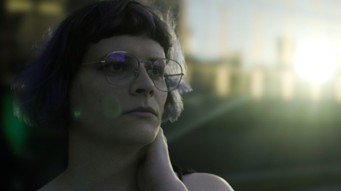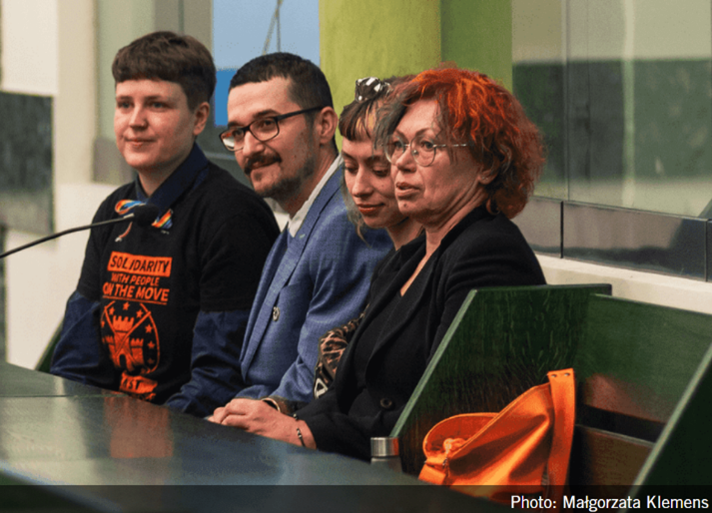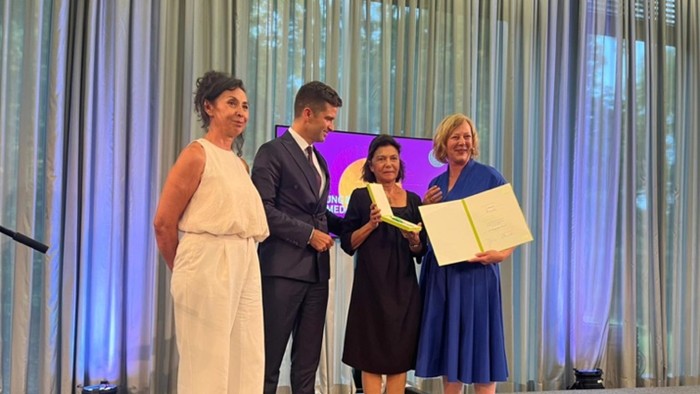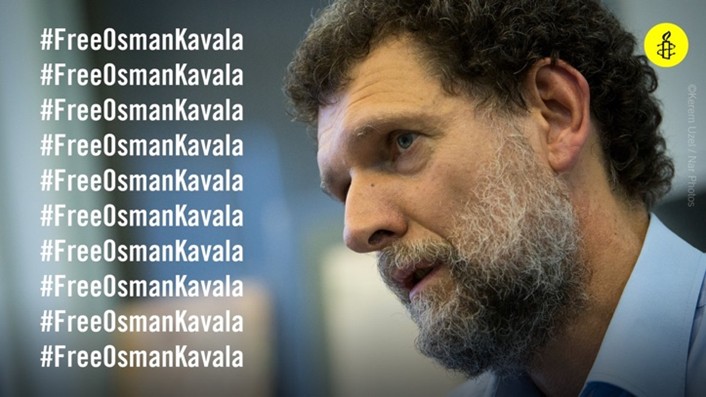We are living in dangerous and precarious times. The times of a consensus on the importance of universal human rights are seeming to become distant memory and the challenges at home and across the globe are huge. As human rights activists we have to hold on to the candle and defend the human rights of all. At the sharp end again are the most vulnerable: refugees who had to flee persecution at home and are dehumanised demonised in their host countries and at the borders. It is on us to defend the people and principle against the tide of disinformation and hate.
Poland
by Lucja Jastrzebska
LGBTQI Rights Urgent Action
 Amnesty Poland are currently carrying out an urgent campaign action aimed at exposing and challenging X’s (formerly Twitter) failure to prevent and mitigate technology-facilitated gender-based violence (TfGBV), particularly targeting LGBTI communities.
Amnesty Poland are currently carrying out an urgent campaign action aimed at exposing and challenging X’s (formerly Twitter) failure to prevent and mitigate technology-facilitated gender-based violence (TfGBV), particularly targeting LGBTI communities.
Together, we can amplify the voices of those affected and demand that governments act to regulate Big Tech and uphold human rights online.
Campaign Overview
On 25 September, activists around the world, including LGBTI advocates in Poland, took part in a coordinated Twitter storm. Participants posted campaign visuals or videos using the hashtags #MakeItSafeOnline and tagging relevant regulatory authorities.
This action sends a clear message: Unaccountable billionaires cannot rule our lives. Governments must regulate Big Tech to protect our rights.
Full Documentary: Log Out of Hate (14 mins)
Investigates how X enables targeted hate against LGBTI people in Poland.
YouTube (English subtitles): https://www.youtube.com/watch?v=Rc9sPyvx6FI
We encourage you to promote the full documentary alongside your campaign posts to deepen understanding and engagement.
You can also read the new report here: https://www.amnesty.org/en/latest/news/2025/09/poland-lgbti/
Refugee Rights – The Polish/Belarus Border
Solidarity is not a crime!
 Update – Five acquitted
Update – Five acquitted
On September 8, 2025, the first-instance judgment was issued. The court found that the actions of the “Hajnówka Five” were lawful. This confirms that providing assistance to people stranded on the Polish-Belarusian border is a manifestation of our humanity and deserves praise, but cannot be the basis for prosecution and punishment.
The first-instance ruling is not final. We will continue to monitor further developments in this case. We thank everyone who signed our petition and supported those providing assistance!
Five people have been brought before a court in Hajnówka, facing up to five years in prison for… showing solidarity. Their “guilt” was feeding, warming, and transporting people stranded in the forest on the Polish-Belarusian border. Among them were women and children – all in dire need. Those who provided humanitarian aid to those in need are now being accused as criminals.
A humanitarian crisis has been raging on the border for years, and aid from social organisations and residents is often the only chance for survival for lost and exhausted people. Criminalising these actions not only violates moral principles but also violates international law, including the right to life. Humanitarian aid cannot be punished. On the contrary, it should be protected, and the actions of individuals like the five from Hajnówka supported.
Let’s not allow solidarity to be prosecuted as a crime. We call for an immediate end to repression against those providing aid and the implementation of real protection for human rights defenders.
Sign the petition – stand on the side of law, humanity and solidarity!
Link: https://www.amnesty.org.pl/akcje/petycja__solidarnosc_to_nie_przestepstwo/
Keep up to date with our campaigns, actions and news on social media:
Instagram: https://www.instagram.com/amnestyuk_europe/
Twitter: https://x.com/amnestyukeurope?s=11
Facebook: https://www.facebook.com/share/175zmPtRSv/?mibextid=wwXIfr
Türkiye
by Chris Ramsey
The Goethe Medal 2025 Award Ceremony and Osman Kavala’s Acceptance Speech
 Osman Kavala was awarded the Goethe Medal, one of Germany’s most prestigious state honors, alongside Chinese linguist Li Yuan and Belgian writer David Van Reybrouck. The award is presented to its recipients every year on the birthday of German writer and poet Johann Wolfgang von Goethe. On August 28, 2025, at a ceremony held in Weimar, Goethe’s birthplace, Osman Kavala’s wife, Prof. Ayşe Buğra, accepted the award on his behalf. Following a presentation by Shermin Langoff, director of the Maxim Gorki Theater, Ayşe Buğra read Osman Kavala’s acceptance speech.
Osman Kavala was awarded the Goethe Medal, one of Germany’s most prestigious state honors, alongside Chinese linguist Li Yuan and Belgian writer David Van Reybrouck. The award is presented to its recipients every year on the birthday of German writer and poet Johann Wolfgang von Goethe. On August 28, 2025, at a ceremony held in Weimar, Goethe’s birthplace, Osman Kavala’s wife, Prof. Ayşe Buğra, accepted the award on his behalf. Following a presentation by Shermin Langoff, director of the Maxim Gorki Theater, Ayşe Buğra read Osman Kavala’s acceptance speech.
Below is the text of the speech:
Osman Kavala’s Goethe Medal Acceptance Speech:-
“I am very much honoured to be awarded the Goethe Medal together with two distinguished individuals, Ms. Li Yuan and Mr. David Van Reybrouck. I would like to express my thanks to the jury for including me among this year’s awardees.
The long-standing fruitful cooperation between the Goethe-Institut and my organization, Anadolu Kültür, must have been an important factor in the jury’s decision. Therefore, I would like to share this honour with my colleagues who made important contributions to our joint projects, in particular Asena Günal, who has successfully steered Anadolu Kültür in my absence.
In the face of the haunting problems of today —wars, acts of aggression, migration, and oppressive policies— I believe that it is more important than ever for us to stand up and work for the advent of a genuinely universalist humanism. For those of us who believe that the mental and emotional bridges necessary for the realization of this ideal could be constructed through arts and literature, the writings of Goethe have a very special meaning and relevance in the context of the realities of our times. As you all know, Maestro Barenboim, who received the Goethe Medal in 2007, and Edward Said, when they formed an orchestra bringing together young Jewish and Arab musicians, were inspired by Goethe’s West-Eastern Divan (West-östlicher Divan), a magnificent literary-intellectual bridge between Western and Eastern poetry revealing the shared sensitivities and values of humanity. Anadolu Kültür’s project to organize a Turkish-Armenian youth orchestra, which participated in the Young Euro Classic Festival held in Berlin, was motivated by the meaningful initiatives of Said and Barenboim.
During my stay in prison, I had the chance to read more of Goethe’s work and the inspiring article by Professor Jeremy Adler, “The Genealogy of ‘Human Dignity’” . In this article, Adler discusses Goethe’s contribution to the development of the concept of human dignity, which has become so central to the evolution of the norms and values of humanity inherent in the framing of human rights.
As Adler writes, in parallel with Kant, Goethe introduced a universalist content to this concept by grounding it in the autonomy of the individual. The conceptualization of dignity as a human attribute “that grows, changes and develops in an organic manner in order to achieve its full potential in body and mind” first appeared in Goethe’s writings. In “Wilhelm Meister’s Apprenticeship” (Wilhelm Meister’s Lehrjahre), it is possible to see that for Goethe the existence of a vibrant cultural environment, participation in cultural activity, and the possibility of access to works of art and literature created in societies other than one’s own appear as essential elements contributing to such an “organic self-development”.
Respect for human dignity became a universal norm after the Second World War in light of the Holocaust experience and other collective crimes committed against humanity. The concept served to provide a secure basis for human rights and contributed to their expansion, as human rights have in time come to be understood in terms of the realization of the social, economic, and cultural conditions necessary for the full development of human faculties in harmony with the social environment, an axiom which, as Adler notes, echoes Goethe’s concept of organic self-development in its close association with dignity. In its new content, dignity empowers the individual against the state, adding a moral value to his or her citizenship status.
However, despite the universalization of human dignity and the stipulations asserting its inviolability in domestic laws and international covenants, grave violations of human dignity continue, particularly in war zones and through the practices of political prosecution under anti-democratic regimes. But such assaults from the outside would not necessarily result in destroying an individual’s self-dignity. Even under such conditions, the sense of one’s dignity continues to be empowering and helps the individual to maintain his or her strength to resist oppression and persecution.
I would like to point out the contribution of literature, not only to the conceptualization of dignity, but also, and perhaps more significantly, to the transmission of the feelings and sensibilities that enable the internalization of the concept. This has been my experience in prison. For me, the Goethe Medal will be a symbol evoking and reinforcing all the meanings of human dignity.”
Osman Kavala
August 28, 2025
Gezi Prisoners of Conscience
More evidence that our solidarity campaign for the Gezi Prisoners of Conscience is so important. Both the York and North Lincolnshire groups have had really appreciative responses in the form of cards direct from the prisoners or e-mails (via their lawyers) from Osman Kavala, Can Atalay and Tayfun Kahraman.
Posting cards and letters using the “Tracked and Signed” level of service (starts at £8.50) appears to be really important.
Fortress Europe kills
by Ulrike Schmidt
Throughout the West living standards are declining due to the shift in economic power to China and East Asia, and the domestic economic policies of different Western Governments. Politicians are seeking scapegoats to deflect growing unhappiness and far right propaganda backed by fascist billionaire Elon Musk and others are directing resentment and anger away from the sources of a deeply unequal economic system towards the most powerless and vulnerable in society: refugees and migrants.
In the UK this has resulted in organized mob violence against refugees in asylum accommodation, and open racism, including violence against ethnic minorities.
Throughout Europe this disinformation, amplified by Trump in America, has resulted in the growth of far-right parties, who endorse white supremacy and racism, openly calling for “remigration” of refugees, migrants and even citizens of colour.
Instead of challenging the disinformation by the far right with facts and celebrating diversity and universal human rights ,UK and other European governments have reacted to the threat by the far right by adopting and therefore legitimizing some of their demands and rhetoric. This has resulted in strengthening and legitimizing this toxic ideology of hate and division.
The universal human right to asylum from persecution is undermined in many ways, and cynically sabotaged at the borders of Fortress Europe. In essence the European policies on migration boil down to keeping refugees out of Europe at all cost. At the cost of human lives. People are left to die when crossing the Mediterranean sea and countries with terrible human rights records are tasked with preventing refugees to reach Europe at all costs.
Europe is paying Libya and Tunisia prevent refugees from reaching Europe, and this is often resulting in unimaginable violence.
Amnesty has documented this abuse in several reports, read more :
On 24th August the Libyan coastguard opened fire without warning on a rescue ship operated by the humanitarian organisation SOS Mediteranee in international waters. The attack endangered the lives of 35 crew and 87 rescued survivors .
I am attaching the open letter to the European Commission, signed by numerous human rights organisations including Amnesty International.
Please read the attached PDF for a detailed insight into the collaborations and omissions leading to severe human rights abuses and death, and the demands of the human rights community including Amnesty International.
Best regards Ulrike and the Europe Team.
Chris Ramsey
Lucja Jastrzebska
Jovana Bosnjak
Ulrike Schmidt